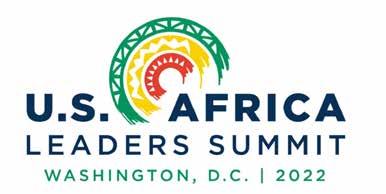
11 minute read
US African Summit
AFRICA from Page 1
Young Leaders Forum, was heralded as an effort to foster stronger relationships between the African continent and the Diaspora.
That morning, Sierra Leonean President Julius Maada Bio and Liberian President George M. Weah spoke to attendees and acknowledged the importance of improving the lives of African youth.
Bio and Weah counted among 49 African heads of state who, along with Chairperson for the Commission of the African Union (AU) Moussa Faki Mahamat, are scheduled to attend the summit.
The White House didn't invite Sudan, Mali, Burkina Faso and Guinea to the summit, due to the suspension of their AU membership. However, reports surfaced of some engagement with those countries' civil society organizations.
Additionally, select African leaders have been scheduled to engage President Joe Biden (D) in a multilateral discussion about 2023 elections in Congo, Sudan and the newly formed South Sudan.
Throughout much of Tuesday, Biden administration officials met with African leaders in bilateral and multilateral meetings about trade relations, youth affairs, health, climate change and technology.
During a Congolese protest just feet away from the Washington Convention Center, the Democratic Republic of Congo, Zambia and the United States signed a memorandum of understanding further solidifying American access to natural minerals for the development of electric vehicle battles.
Linda Thomas-Greenfield, U.S. ambassador to the United Nations, had also been scheduled to sit down with Gabonese leaders, but that afternoon meeting got cancelled at the last minute. The Department of Commerce, the U.S. Chamber of Commerce and the Corporate Council on Africa, along with the Prosper Africa Initiative, have been scheduled to host the U.S.-Africa Business Forum on Dec. 14. In what’s called the Deal Room, Prosper Africa plans to announce new commitments from the U.S. and African businesses, governments and investors.
GRASSROOTS ORGANIZERS COUNTER THE STATE DEPARTMENT’S NARRATIVE
While the summit has been described as an opportunity to build on shared priorities with African leaders, some U.S.-based, Pan-African grassroots organizers continue to express skepticism about the U.S. government’s true intentions.
People, like Netfa Freeman, noted that the U.S. wants to counter Russia, and more so China’s, expanding influence on the African continent.
In a move that took some by surprise, China recently announced that its government would forgive 23 interest-free loans issued to 17 African countries and divert $10 billion of its International Monetary Fund (IMF) resources to the African continent.
That development came amid the Senate’s deliberation on legislation that, if passed, would dedicate resources to countering Russian influence on the African continent. Much to the chagrin of U.S. officials, more than a dozen African countries voted against or abstained from voting on a United Nations resolution condemning Russia's invasion of Ukraine earlier this year.
This past summer, federal agents raided African People Socialist Party Chariman Omali Yeshitela’s St. Louis, Missouri and St. Petersburg, Florida homes in response to concerns that he colluded with Russianss.
This week, Freeman, a member of Black Alliance for Peace, counts among those who are participating in another set of events, titled “Africa Anti-Imperialist Week of Actions.” As with the summit, activities kicked off on Tuesday afternoon, miles away from the Washington Convention Center at the Institute for Policy Studies, with a forum titled, “Africa Anti-Imperialist Summit: Voices from the Ground.”
Other activities on Dec. 13-16 include rallies and protests, all aimed at further highlighting the U.S.’ military presence in most parts of the African continent via the U.S. Africa Command, more commonly known as AFRICOM.
“This summit obscures the fact that the U.S. has advanced its influence and hegemony on Africa and the rest of the world through force and military coercion, in terms of these military bases,” Freeman said.
“They’ve also done it through financial institutions like the IMF and world banks," he continued. "African nations are subjected to high interest rates and policies that require them to change their domestic policies like privatization of state-run agencies. This would be for the benefit of foreign interests.”
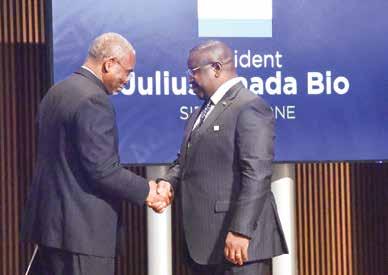
5 Congressman Gregory Meeks (D–New York) greets Sierra Leone President Julius Maada Bio during the 2022 U.S.-Africa Leaders Summit at the Smithsonian Institute National Museum of African American History and Culture on Dec. 13. (Robert R. Roberts/The Washington Informer) 5 David Moinina Sengeh, a millennial and Sierra Leone's minister of basic and senior secondary education. (Robert R. Roberts/The Washington Informer)
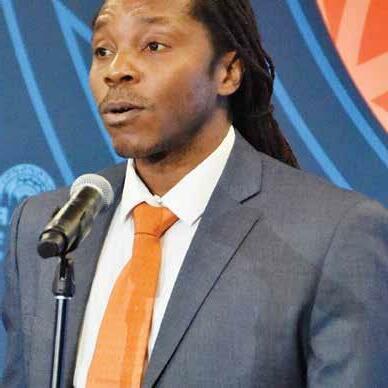
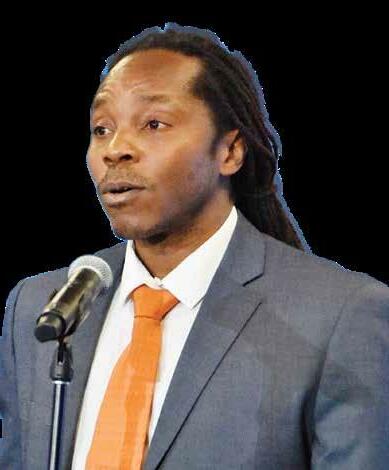
U.S. OFFICIALS CONTINUE TO MAKE REASSURANCES
Last week, senior administration officials speaking in background said that the U.S.-Africa Leaders Summit wouldn't focus on Russia or China. They instead described it as part of an effort to advance the Africa Development Bank’s Agenda 2063 Plan.
The goals of the Agenda 2063 Plan include the creation of tools to ensure the continent’s collective security and interests, and the guarantee of human rights, democracy, gender equality, inclusion and peace for all citizens.
Days before the summit, President Joe Biden (D) revealed plans to visit several African countries in 2023. National security advisor Jake Sullivan also said earlier this week that the U.S. will commit $58 billion to African nations over three years.
In years past, the U.S. invested in African countries to mitigate the spread of malaria, HIV and COVID. In the realm of education, investments facilitated the launch of the Young African Leaders Initiative, also known as YALI, through which African youth get to spend weeks in the U.S. and develop their leadership skills.
While addressing African youth at NMAAHC on Tuesday, Vice President Kamala Harris (D) said she will work with Congress to secure an additional $100 million to sustain leadership development and skills development among underrepresented populations in Africa, particularly women.
Harris also announced the launch of the President’s Advisory Council on Africa Diaspora Engagement in the United States. This entity, also known as PAC-ADE, will enhance dialogue between the U.S. government and the African diaspora. In her remarks, the vice president talked about the NMAAHC’s Yoruba-influenced structure and alluded to African Americans’ shared history with the African continent.
Harris also attempted to reassure African youth that they would be able to participate in what she described as a collective endeavor to boost the African continent’s standing in the world.
“The Biden administration intends to be beside you young leaders, knowing it’s the spark and determination of young people that will drive us forward,” Harris said.
She also made a promise to continue investing time and energy to fortify partnerships across Africa “grounded in candor, openness, inclusiveness, shared interest and mutual benefits.”
The vice president emphasized the Biden administration’s goal of true collaboration.
“And overall, our administration will be guided not by what we can do for Africa, but what we can do with Africa.” WI @SamPKCollins
Pre Summit Event Emphasizes Bridging the Business Gap Between U.S. and Africa
Micha Green WI Managing Editor
As a Basketball Africa League player and entrepreneur, D.C. area native Jared Harrington combined his passion for money management and “rebranding Africa. On Dec. 12, a day before the Biden Administration’s three-day U.S.-Africa Summit, Harrington hosted “Innovation Now” a networking event that included panels with a clear message– Africa is abundant in wealth, opportunity and resources.
“I’ve seen millions, I’ve seen so much agriculture, so much private equity,” Harrington said in a WIN-TV interview leading up to the event held at Ivy City Smokehouse in Northeast. Harrington founded the event’s sponsor organization Beat the Odds, which teaches the simplistics of financial literacy and has programming in Africa, Mexico and the U.S.
To elaborate on some of the opportunities found throughout Africa, Harrington invited speakers: Rep. Oye Owolewa, shadow representative for D.C. in the U.S. House of Representatives; Julius Mwale of Mwale Medical and Technology City; and Lloyd Ward, CEO and co-founder of Ward Holdings International.
Through the event, Harrington hoped to expose audiences to opportunities in Africa that support those on the continent and awaken Americans to all Africa has to offer.
“We are focused on bridging the gap between African and American business,” said Harrington.
With trips to the continent and people working to trace their African roots on Ancestry.com, Nigerian-American Owolewa said it’s time to put the same enthusiasm behind building business partnerships in Africa.
“We’re trying to match that energy and make sure that our money, resources, our thoughts, our heroes like Jared, our heroes like Lloyd… are able to not only be able to invest in Africa, but bring us with them too.”
Through Beat the Odds, Harrington, 25, helps people see beyond being a consumer.
“We’re focused on relatable literacy…We offer real world examples,” Harrington said.
“I go a lot of places and I say, ‘How many of you people own an iPhone? And everybody raises their hands or stands up,” the basketball player said.
When posing a question about owning Apple stock, he said little to no people stand or raise their hands.
“We’re consumers, when we could be owners,” Harrington added.
Ward, who was the first Black CEO of Maytag and co-founded Ward Holdings International, Ward Holdings Africa and Ward Holdings Tanzania, shared the gems he’s learned through business ventures domestic and abroad.
The company’s namesake said Ward Holdings is all about working to help make the world a better place, specifically focusing on Africa, because the continent “is so important to the future of this world.”
Ward Holdings co-founder and CFO Martin Johnson said the company builds bridges between the U.S., Africa, China, India and other parts of the world. One way they’ve built opportunities is through TanzaNutz, a partnership with Tanzania’s agricultural ministry.
Johnson said Ward knows how to sell products with former executive leadership roles with Maytag, FritoLay, PepsiCo and Procter and Gamble. He explained by virtue of Ward’s background, the duo is confident in the advantage of consumer packaged goods, and implemented that thought with TanzaNutz.
The founders emphasized TanzaNutz will contribute to Tanzania, the country’s farmers and in-country processors. They also plan to pay the company’s Tanzanian employees– 95% of whom are women– competitive rates beyond the $4 to $7 they make now, and offer benefits, retirement and vacations.
“We’ve always said that we will win when Tanzania wins, we will win when Africa wins. Tanzania must win
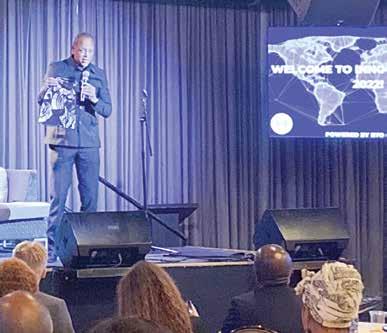
5 Lloyd Ward, CEO and co-founder of Ward Holdings International, Ward Holdings Africa and Ward Holdings Tanzania, shows off a bag of TanzaNutz, a product birthed from a partnership with Tanzania’s agricultural ministry.
U.S. AFRICA SUMMIT
Why Partnering with Africa is Important to the Biden Administration
Lafayette A. Barnes Guest African Affairs Writer
The Biden Administration kicked off its U.S.--Africa Leaders Summit at the Walter E. Washington Convention Center in the nation’s capital for some 49 African heads of State and the African Union (AU) Chair Commissioner
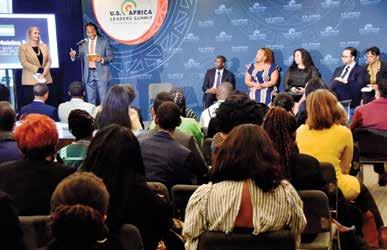
5 Dr. David Moinina Sengeh, Minister of Basic and Senior Secondary Education in Sierra Leone, participates in a panel discussion during the 2022 U.S.-Africa Leaders Summit at the Smithsonian Institute National Museum of African American History and Culture on Dec. 13. (Robert R. Roberts/The Washington Informer) from Dec. 13 to Dec. 15. This is the first summit since 2014 that focuses on strengthening partnerships between the U.S. and advancing their shared business and economic development priorities. Its outcomes are to enhance the participating nations’ long-term relationships, and leverage U.S. public and private sector resources to support and empower African citizens, institutions, and nations.
After a seven-year hiatus, one must ask why is Africa so important that the White House has decided to host another summit? Several reasons come to mind as African nations represent the largest regional voting bloc in the United Nations, it’s a key geopolitical player, and once fully implemented, the African Continental Free Trade Area (AfCFTA) will connect 55 countries across the continent with a gross domestic product valued at $3.4 trillion and become the largest free trade market in the world.
African leaders are keenly aware of the continent’s global comparative advantage and are promoting the need for more U.S. support to advance the AU’s Agenda 2063 that was adopted by its members in 2015 in Addis Ababa, Ethiopia. The agenda provides a continental strategy for economic and social development in Africa. Some of its top priorities are to build a highspeed train network that connects to all African capitals and commercial centers, establish the AfCFTA, as well as the Pan African digital data network.
The Biden Administration has adopted the Partnership for Global Infrastructure and Investment and pledged $200 billion over five years to support the AU’s efforts to develop these projects.
President Joe Biden is scheduled to deliver a keynote address at the summit on Dec. 14 and later his administration will provide more details about U.S.- Africa partnerships with the release of its new African Strategy in August 2023.
The Summit and new African Strategy successes will be measured by the government’s capacity to get beyond the rhetoric. The outcomes will be judged on the administration’s ability to appropriate more blended public-private resources that address Africa’s development. Africa faces a variety of challenges such as global climate change, population growth, and workforce development especially among African youth. In addition to growing and sustaining trade between the U.S. and Africa, the U.S. Congress must reauthorize
PARTNERING Page 34










